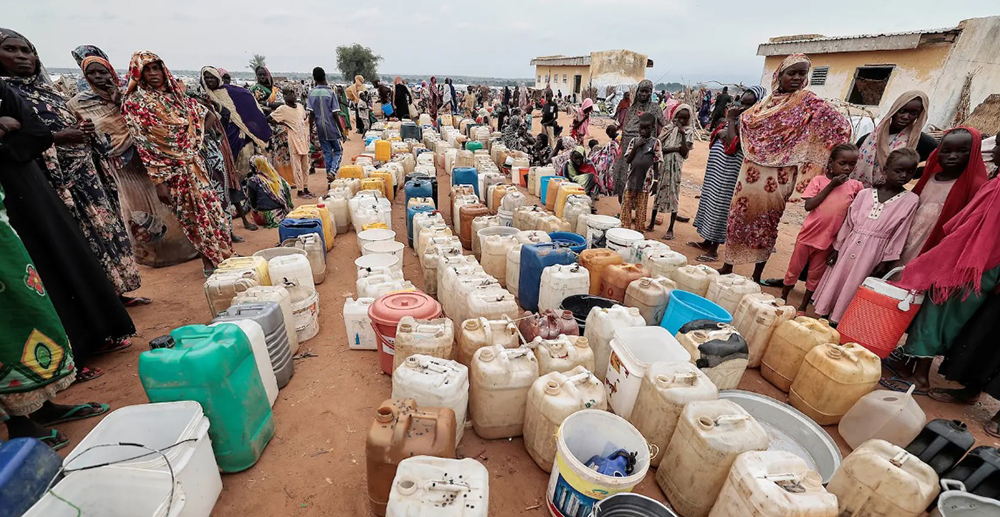
Human Rights Watch: The Security Council Should Act on Aid in Sudan
moatinoon
Human Rights Watch called on the Security Council to immediately act on the possibility of aid reaching those in need in Sudan, including imposing sanctions against those responsible for obstructing aid delivery to Darfur. It revealed that UN Secretary-General António Guterres is expected to alert the Security Council in the coming days to the fact that Sudan is plunging into a severe famine resulting from conflict.
Akshaya Kumar, director of crisis advocacy at Human Rights Watch, said in a statement released yesterday, Friday, "The Security Council will be formally notified that the conflict in Sudan threatens to trigger the worlds largest hunger crisis."
She added, "The Council broke months of silence by adopting a resolution on Sudan last week, and it should build on this momentum by imposing consequences on those obstructing aid delivery to those in need."
Kumar said, "Council members must show leadership by holding open discussions to develop a plan to prevent the risk of mass famine in Sudan and impose targeted sanctions on individuals responsible for obstructing aid," adding, "The people of Sudan need more than just words. They need food."
This is the first time that Sudan has been highlighted in this type of warning from the Secretary-General to the Security Council. Guyana, Switzerland, the United States, and other Security Council members have pledged to make combating food insecurity a priority for the strongest UN body.
She explained that the alert will be sent to the Council in the form of a "white note," drafted by the Office for the Coordination of Humanitarian Affairs (OCHA) in accordance with its mandate under Security Council Resolution 2417 to sound the alarm about "the risk of conflict-induced famine and wide-spread food insecurity."
She indicated that OCHAs note follows warnings by international relief experts, Sudanese civil society leaders, and Sudanese emergency responders that people across Sudan are dying of hunger, and follows Sudans Armed Forces brazenly escalating efforts to restrict the movement of humanitarian aid.
She added that the Security Council reaffirmed in a statement issued in 2023 its "strong intention to give full consideration" to the information provided by the Secretary-General when he is alerted to situations involving conflict-induced food insecurity.
The Council must respect this commitment and hold an open meeting to discuss the findings of OCHA, which may pave the way for decisive action, including imposing sanctions on individuals responsible for obstructing aid delivery.
Last week, the Security Council called on "all parties to ensure the removal of any obstacles to the delivery of aid and enable full, rapid, safe and unhindered humanitarian access, including across borders and across lines, and to comply with their obligations under international humanitarian law."
The Office of the High Commissioner for Human Rights has previously considered that "apparently deliberate obstruction of safe and unhindered access for humanitarian agencies within Sudan itself constitutes a serious violation of international law, and may rise to the level of a war crime."
The organization reviewed the difficult humanitarian situations faced by stranded citizens in conflict areas, stating that both parties to the conflict impose restrictions on the delivery and distribution of aid, while 90% of Sudanese facing emergency levels of hunger live in areas "largely inaccessible to the World Food Programme."
Relief groups face a maze of bureaucratic obstacles, including delays, arbitrary movement restrictions, harassment, and outright bans on some supplies.
Relief operations have been choked by limited funding, widespread warehouse looting, and widespread attacks on relief workers, including killings, injuries, and arrests.
The World Food Programme and the UN Food and Agriculture Organization have said that food security in Sudan has deteriorated significantly and more rapidly than expected, with a risk of "catastrophic conditions" striking West and Central Darfur during the lean season.
The Early Warning Systems Network for Famine warned in February that "the most affected populations... in Omdurman (in Khartoum State) and El Geneina (in West Darfur State)" are expected to lose nearly 230,000 children, pregnant women, and new mothers in the coming months due to hunger.
In Darfur, civil society and local leaders have repeatedly sounded the alarm about hunger among displaced persons living in camps in areas controlled by the Rapid Support Forces. Leaders pointed out that their communities have resorted to eating ants, tree bark, and animal feed.
In January, Médecins Sans Frontières sounded the alarm about malnutrition in the Zamzam camp in North Darfur, warning that "an estimated one child dies every two hours." A camp leader from Kalma camp in Nyala (South Darfur) told Human Rights Watch that between 500 and 600 children and at least 80 elderly people have died in the camp since the conflict began due to what is believed to be a result of food and medical shortages.
In Khartoum, the communications blackout forced hundreds of community kitchens run by Sudanese emergency response rooms, a popular network for mutual assistance, to temporarily suspend operations, leaving many people without food, while reports emerged of individuals dying alone in their homes from hunger.

